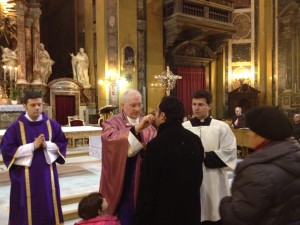VATICAN CITY — Cardinal Marc Ouellet ambled across St. Peter’s Square Saturday afternoon unnoticed by swarms of pilgrims, tourists and journalists.
Thirty hours later the 68-year-old Canadian, who is among the favourites to be named as the next pope, was greeted by hundreds of journalists when he celebrated mass Sunday evening in a packed church 200 metres from the Vatican.
 If Ouellet is chosen to succeed Benedict XVI as the Vicar of Christ at a papal conclave that is to begin Tuesday one can only imagine how much life will change for the burly prelate from the backwoods of Quebec. At a minimum the avid hockey player and fan will never again enjoy a leisurely stroll in St. Peter’s Square or a quiet vacation with his 91-year-old mother Graziella, or hunting and fishing with friends and relatives in his birthplace of La Motte, Que., a tiny village 500 kilometres northwest of Ottawa.
If Ouellet is chosen to succeed Benedict XVI as the Vicar of Christ at a papal conclave that is to begin Tuesday one can only imagine how much life will change for the burly prelate from the backwoods of Quebec. At a minimum the avid hockey player and fan will never again enjoy a leisurely stroll in St. Peter’s Square or a quiet vacation with his 91-year-old mother Graziella, or hunting and fishing with friends and relatives in his birthplace of La Motte, Que., a tiny village 500 kilometres northwest of Ottawa.
Parishioners who attended Ouellet’s mass at the Santa Maria in Traspontina Church in Rome on Sunday were unanimous that he had given a bravura performance. Speaking entirely in Italian at the local church assigned to him as cardinal-priest when he became one of the princes of the church is 2003, Ouellet said during his homily that God had already decided who the next pope would be and that the cardinals would simply be naming the one that He had already chosen.
“This is not only a big event for the Catholic Church but for the world, which is watching,” the former Archbishop of Quebec said in another reference to the conclave, or perhaps to the wall of television cameras lined up near the altar.
After the mass an elderly woman gushed that Ouellet’s charisma reminded her of John Paul II, who chose him to be a cardinal in 2001. Another female parishioner described Ouellet’s homily as “fantastico.” A third described it as “a great event. The cardinal is so linguistically gifted.”
“We need someone who can spread the word of Christ. This cardinal is such a man,” said Mario Galgano, a Vatican administrator who has often heard Ouellet celebrate masses. “He not only speaks good Italian but his message is very clear. He is exactly the kind of man the church needs.”
Galgano noted that the Italian media’s highly opinionated Vaticanistas had written a lot last week about the advantages of an American pope because cardinals from the U.S. were thought to be such great communicators.
“The passport is of no importance,” he said. “When I go to the Vatican supermarket there are Africans and Chinese there, too. Being a Canadian should be no handicap.”
Another fan was journalist Margarita Rojas of Colombia, where Ouellet worked for many years as a professor assisting Spanish-speaking seminarians in their formation.
“You could say that Cardinal Ouellet is as much Colombia’s candidate as he is Canada’s,” Rojas said. “He is really close to the Colombian people and still has many friends there.”
While not as obviously gregarious as several of the American cardinals, who constantly sought out journalists before being banned from doing so last week, Ouellet definitely has a greater stage presence than most of his media-shy European brethren. However, trying to balance these two qualities can be a tricky game. It is believed the cardinals badly want a pope with more charisma than Benedict, who was regarded as a better writer and thinker than public performer.
But if a pontiff has too much charisma, his outsized personality could dilute or divert attention from the church’s message or prevent him from tackling the grave issues facing the world’s 1.2 billion Roman Catholics
Still, with the media having anointed as many as dozen favourites to succeed Benedict, including strong candidates from Hungary, Italy and the developing world, and the cardinals being notoriously secretive, it is bootless to speculate too much about who might be ahead and who might be trailing.
Ouellet has the slightly squashed face of a pugilist and is famously tough. Such attributes might help root out deep corruption in the Vatican and firmly deal with priests guilty of abusing children.
At the same time the cardinal is regarded as a conservative traditionalist who would not rock the boat much theologically on matters such as abortion, contraception and the ordination of women priests to say nothing of same-sex marriages. Such views have soured some commentators and reform-minded Catholics. But such principles are precisely why some of the 115 cardinal electors may consider Ouellet to be a ‘papabile’ (contender).
“What the media and the cardinals think are two very different things and we should not confuse one with the other,” was how Mario Galgano, who works with laity at the Vatican, put it.
Source: Post Media News
